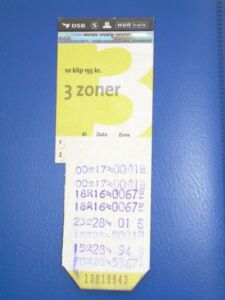News
From midnight, the klippekort will officially be no more
This article is more than 10 years old.
Today is the last chance to use it in the metropolitan area

Goodbye old friend! (photo: Danielle Keller)
Over a year later than initially planned, today is the final day on which you can use your klippekort – the coloured paper tickets used to travel on transport in the metropolitan area.
“23:59 on June 30 is absolutely the last chance to use the klippekort,” Aske Wieth-Knudsen, the director of business development for DSB, told Ekstra Bladet.
But whilst the end is in sight for the traditional method of payment, DSB suspects that for most travellers it has been a thing of the past for a while now.
“Our customers were informed about this over a year ago, and we stopped selling them on February 8 this year. I highly doubt that very many of our customers have hundreds of klippekorts remaining in their wallets,” Wieth-Knudsen continued.
Control fee for using klippekort
While people living outside the metropolitan area will still be able to use their klippekort using automated klippe-machines at selected stations, be warned that if you do use an outdated ticket in most areas, you won’t get off lightly.
“We expect there may be a few customers who have not heard that the klippekort has been abolished,” said Wieth-Knudsen.
“In principle, the klippekort is no longer a valid travel document after June 30, so that means you risk receiving a fine.”
Use rejsekort instead
DSB encourages customers to start using the rejsekort.
“In addition to getting the cheap ‘klippekort’ prices, you also get 20 percent discount when travelling outside peak times,” said Wieth-Knudsen.
Customers can also use DSB’s mobile vouchers and mobile tickets, which they can buy using the DSB, Movia and Metro company’s official app.
And what do you do if you are not quite so digitally minded?
“You can still buy old-fashioned cash tickets from our ticket machines and at our stations. But it is at a slightly higher price, so we recommend you acquire a travel card, for it is the cheapest option for local travel in the capital,” said Wieth-Knudsen.










































